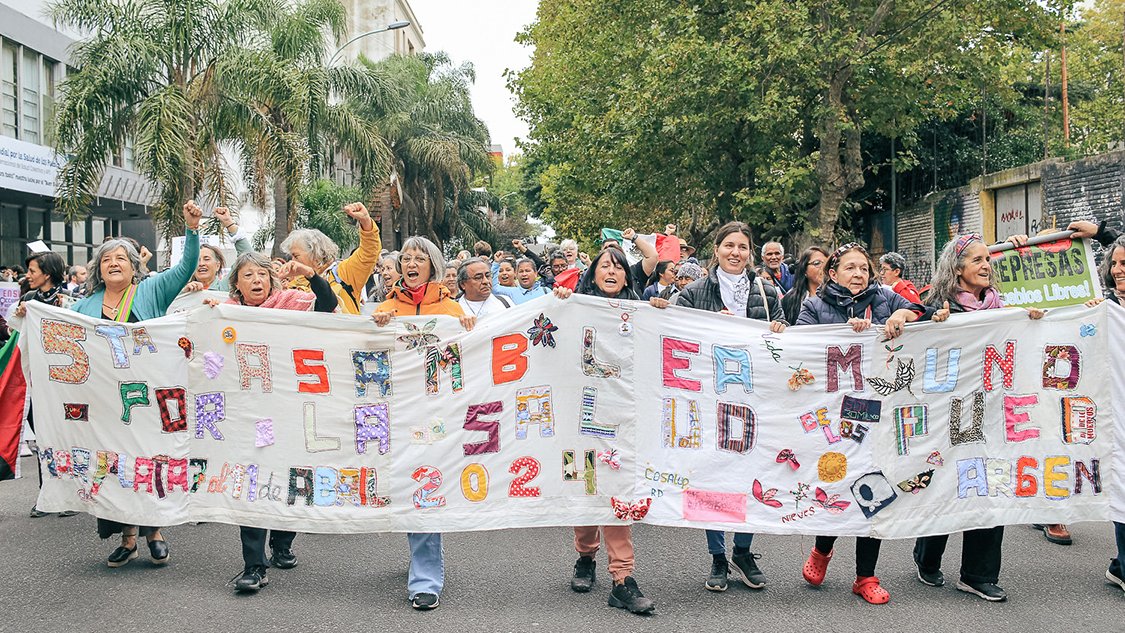Hundreds of health activists gathered in Mar del Plata, Argentina, in April to reinvigorate the struggle for health rights. This fifth global assembly since 2000 underscored the enduring vibrancy of the People’s Health Movement (PHM), a prime advocate for health as a human right for all.
Established after the first People’s Health Assembly in 2000, PHM is a global network of activists, social movements, and organizations advocating for health as a fundamental human right, promoting comprehensive primary health care, and striving for equitable health systems.
The fifth People’s Health Assembly featured plenary sessions, sub-plenaries, and interactive workshops focused on five key themes: resistance to war, occupation, and forced migration; traditional ancestral and popular knowledge; gender justice in health; transformation of health systems; and ecosystem health.
“At the heart of our assembly lies the power of people’s movements. Hearing the testimonies of those at the forefront of struggle ignites a fire in our collective spirit, reminding us of the resilience and solidarity that fuels our journey towards health for all,” said Carmen Baez from the local organizing committee during the opening ceremony.
The assembly faced challenges due to Argentina’s new Milei government imposing radical neoliberal policies and the ongoing Israeli genocidal war on Palestine, which complicated travel for several delegations.
Palestinian delegates contributed via video link, with prominent activist Mustafa Barghouti detailing the severe impacts of Israeli attacks on the health system in Gaza. “Today, many countries and free peoples of the world stand in solidarity with the Palestinian people in their tragedy and fight alongside our people to stop the war and support their rights. We ask you to stand on the side of all the free voices in the world,” PHM Palestine asked the assembly in a plea that was met with a standing ovation.
Vivian Camacho, Bolivia’s National Director of Traditional Medicine, emphasized the integration of Indigenous perspectives and needs into Western medical systems. “People’s lives are about our deep identity and cultural resilience. Traditional ancestral medicine is about a deep historical cultural resistance to colonialism, to the violence that has been used against us, to the usurpation of our territories, to the massacre of our peoples,” she said.
“Feminist solidarity locates us in a framework of mutual support,” said Sonia Gutierrez from the Winaq Political Movement in Guatemala, highlighting the potential of women’s struggles to contribute to Health for All. “For the liberation of women, of the peoples who have been conquered, we must free ourselves from historical oppression,” she added. The road to achieving such liberation lies in building a joint social movement representing the existing achievements of feminist struggles and will be built upon the solidarity and unity they already include.
Matheus Falcão from PHM Brazil highlighted that the assembly not only discussed problems but also showcased successful struggles in the fight for health. “In Brazil, we established a system of universal access to health care, achieved through a process we call the Health Reform that took place in the 70s and 80s,” he said. “This is an example of how these achievements are the fruits of people’s struggle, taking the perspective of… communities into account.”
More struggle, unity needed to achieve health for all
The assembly culminated in a Call to Action, developed through a participatory process and emphasizing the need for radical change to counter the crises of capitalism and imperialism. The document calls for replacing the capitalist mode of production, consumption, and life with a system based on sovereignty, self-determination, equality, and cooperation between nations.
According to the document, only a radical change that replaces the mode of production, consumption, and life generated by capitalism can reverse the destructive trends of exploitation and extractivism. “We believe the new economic order should be based on the sovereignty and self-determination of peoples, and equality and cooperation between nations, and on solidarity and peace,” it explained, adding that people’s control and ownership of the necessities of life needs to be restored.
Referring to the movement’s theory of change, the Call to Action states: “Transformation of the transnational and imperialist capitalist system to a new international economic, political, and social order will only happen through the joint action and solidarity of social movements, progressive political parties, and nation-states. Class struggle will be a vital part of this action.”
The Call to Action emphasizes the need for national processes that drive economic, political, and social transformation, including progressive reforms in health, education, agroecology, food, energy, and labor. These reforms aim to reduce or eliminate unjust inequalities and create an environmentally sustainable economy. To achieve this, PHM country circles will collaborate with communities to develop locally appropriate solutions to counter neoliberalism and imperialism.
In its conclusion, the Call to Action aims to unite the health movement with other progressive social movements, creating a broad front to establish a new international economic, political, and social order. The PHM also aims to seek alliances with political parties and states that promote this new international economic order.
Wim De Ceukelaire is a health and social justice activist and member of the global steering council of the People’s Health Movement. He is the co-author of the second edition of The Struggle for Health: Medicine and the Politics of Underdevelopment with David Sanders and Barbara Hutton.
Ana Vračar is a health reporter at the People’s Health Dispatch, a fortnightly bulletin published by Peoples Dispatch and the People’s Health Movement. She is the regional coordinator of PHM Europe and Co-Chair of the PHM steering council.
This article was produced by Globetrotter.





